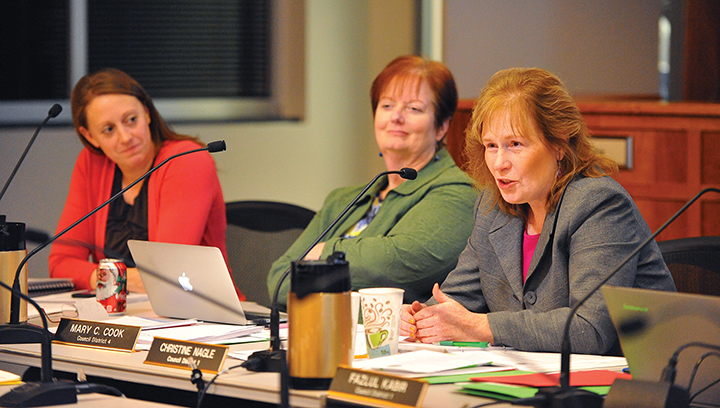By Nate Harold
For The Diamondback
The College Park City Council discussed the future of the city’s Neighborhood Watch Steering Committee Tuesday night and will vote whether to disband the group next week.
The three-member committee was established in 2011 to “promote and support community neighborhood watch programs city-wide,” according to city documents.
Before it was created, College Park had just one citywide neighborhood watch coordinator, who worked with other local coordinators.
The citywide committee positions are vacant, and as a result, District 1 Councilwoman Christine Nagle requested the city discuss whether the program is still necessary.
The city’s public services director Bob Ryan outlined two options for the council: Disband the committee or appoint new members.
“If we’re not going to have an active committee, we might as well disband it,” Ryan said.
Ryan said the steering committee was created primarily to prevent the “burnout” experienced by a single, citywide neighborhood watch coordinator.
However, Ryan said, “many residents don’t have a lot of time to volunteer.”
Additionally, neighborhood watch programs “must be grassroots to gain neighborhood buy-in and participation,” according to city documents, as top-down programs aren’t suited to each neighborhood’s specific characteristics.
Mayor Patrick Wojahn agreed, adding that he didn’t feel the committee had accomplished anything substantial since its inception.
The City Council “has failed to settle on the best way” to coordinate neighborhood watch programs in recent years, Wojahn said. He is in favor of disbanding the committee.
District 2 Councilman P.J. Brennan said individual neighborhood watch groups, as opposed to citywide ones, would be “more effective.”
Ryan said one reason the steering committee isn’t necessary is because of the increased usage of online applications, such as the Nextdoor app.
Nextdoor allows people from the same neighborhoods to discuss news about the local community through a blog app. People can share public safety information with their neighbors, often making neighborhood watch programs unessential.
Neighborhoods have the option to decide what works best for them, whether that be a block captain or a resident patrol model.
Steering committee members “think it would be more effective for the city to convene an annual, perhaps biannual neighborhood watch meeting … to discuss issues, successes as opposed to continuing the CPNWSC,” Brennan said.



